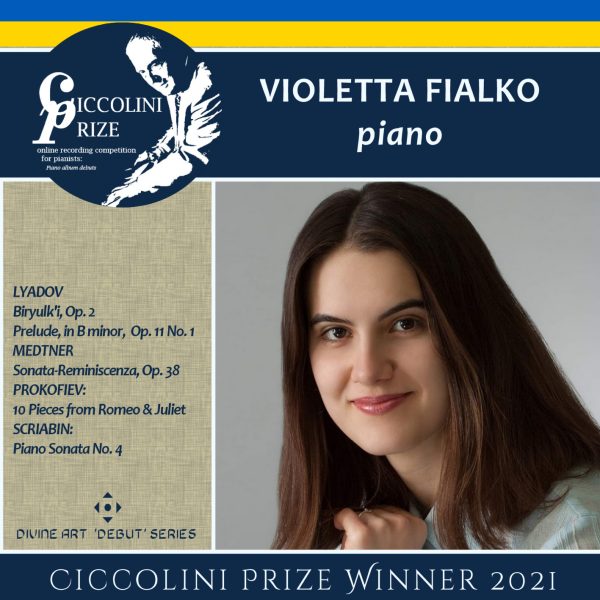Infodad
A new (++++) Divine Art recording featuring Violetta Fialko offers personalized pianism of a very different sort [from the Bach disc just reviewed] – devoted to music that, although far less significant and meaningful than Bach’s, nevertheless has many pleasures of its own to offer. Nearly half of the 70-minute disc is devoted to Prokofiev’s Romeo and Juliet—Ten Pieces for Piano, a work that proves just about perfect to highlight the variegated sounds and expressions that Fialko elicits from the piano. She manages, for example, to maintain the old-style underlying rhythm of Minuet: Arrival of the Guests, while overlaying the material with 20th-century expressiveness; there is naïve enjoyment aplenty in Juliet as a Young Girl; the inherent drama of the well-known Montagues and Capulets comes through strongly and contrasts interestingly with Friar Laurence; and so on.
Fialko is quite comfortable with this music’s essentially down-to-earth elements – but she is also well-attuned to the far more evanescent, near-mystical beauties of Scriabin’s Piano Sonata No. 4, and handles the almost-jazzy rhythmic elements of the second movement to fine effect. The other works on this CD, which are less familiar than the Prokofiev and Scriabin, receive equally fine readings. The Piano Sonata “Reminiscenza” by Nikolai Medtner (1880-1951) has delicacy and an inwardness of expression quite different from those of Scriabin’s No. 4. And the Op. 2 miniatures by Anatoly Liadov (1855-1914), collected as Biryul’ki and sounding like a series of 14 études, are snippets of enjoyment from start to finish – less elaborate and portentous than the Prokofiev movements, but filled with little touches of delight of a salon-music sort. Fialko does especially well with the somewhat-more-intense movements, including the fourth (Allegro con fuoco), the fifth (Vivace), and the sixth (Allegro), but without giving short shrift to the delicate ninth (Allegretto tranquillo) and sweet 11th (Tempo di valse). Fialko also offers Liadov’s Prelude in B Minor, the first of his Trois Morceaux, Op. 11, with warmth and sensitivity. Indeed, everything on this disc has a feeling of being warm and sensitively interpreted, displaying Fialko’s considerable talents to very good effect in music that may be of no great consequence but that produces very considerable feelings of pleasurable enjoyment.
@divineartrecordingsgroup
A First Inversion Company
Registered Office:
176-178 Pontefract Road, Cudworth, Barnsley S72 8BE
+44 1226 596703
Fort Worth, TX 76110
+1.682.233.4978



![🎧 Listen now to the @purcellsingers' first single from their upcoming album, #ASpotlessRose! ➡️ listn.fm/aspotlessrose [in bio]](https://scontent-dfw5-2.cdninstagram.com/v/t51.71878-15/642752592_1424641949105789_8815810652567824072_n.jpg?stp=dst-jpg_e35_tt6&_nc_cat=106&ccb=7-5&_nc_sid=18de74&efg=eyJlZmdfdGFnIjoiQ0xJUFMuYmVzdF9pbWFnZV91cmxnZW4uQzMifQ%3D%3D&_nc_ohc=1oI-Pe3rGJ4Q7kNvwEpnktr&_nc_oc=AdmZsneXTvHg8U_GWyehQZVfaUiZdz6fE4dQ-B64dex997N-kEL4PmAK9sPwvrxgCt_E4WLv1TgIKmb6LWwYQGIO&_nc_zt=23&_nc_ht=scontent-dfw5-2.cdninstagram.com&edm=ANo9K5cEAAAA&_nc_gid=y-Obfq1GkMzsGVDP1yt_zQ&_nc_tpa=Q5bMBQEm0cllCYu_mCGWb7uGn9B_IJh0VVEELkticudB51EdUsAoIE1wDQb55oU2t1n4PhaeLkkyHwrCLw&oh=00_AfzdAeL1JDoom38Ba2YKo-fC3xh9ehvCjUXNjGIcVyK9yg&oe=69AAE001)








